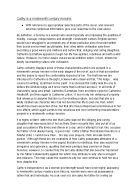Is Catherine Earnshaw a Nineteenth Century Heroine?
Cathy is a nineteenth century heroine.
- With reference to appropriately selected parts of the novel, and relevant external contextual information, give your response to the view above.
By definition, a heroine is a woman who would typically encompasses the qualities of nobility, courage, independence and strength. Nineteenth century English women would have struggled to accomplish any of these particular acts of heroism within their social environment as ultimately, their roles within civilisation saw them becoming a good wives and mothers and before that, obliging and caring daughters. Catherine Earnshaw appears to begin her life free-spirited, rebellious and with a wild nature. However, her inner desire craves social ambition which, in turn, shows her slowly representing culture and civilisation.
Cathy certainly displays some of those characteristics which are present in a nineteenth century heroine in the early stages of the novel, such of that as rebellion and the desire to reject the conformities expected of her. The first time we are introduced to Catherine is through Lockwood who observes that, ‘The ledge… was covered in writing, scratched on the paint’. It is obvious that Cathy was the one to deface the window ledge as it is her name that is etched across it, ‘in all kinds of characters, large and small- Catherine Earnshaw, here and there varied to Catherine Heathcliff, and then again to Catherine Linton.’ It is not only her defacing of property that allows us to assume that she is of a rebellious nature, but also that she is a wildly mysterious character who has not devoted her life to just one man, which would have been expected of her, but that she has perhaps been promiscuous in her love affairs, which again points to the rebellious and non-conforming characteristics present in a nineteenth century heroine.









